Entries marked with this background color and a "*)" were supported by the W3C Offices Activity Fund.
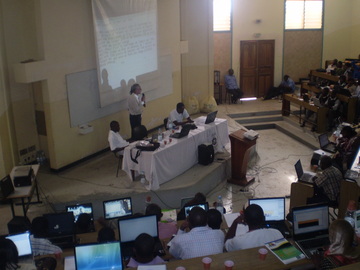
2009-12-29: The W3C Senegal Office with support from the Senegal Internet Society organizes a course on (X)HTML/CSS validation and conformance today. The course is held in the Ecole Supérieure Polytechnique (ESP). It holds a presentation of Ibrahima Ngom from the W3C Senegal Office on the importance of Web Standards and the benefit of conforming to them. The rest of the day covers the use of validators and exercises in fixing pages that do not validate. Participants will receive a certificate of attendance.
2010-01-06: Update: Originally this event was planned for Dec 12th during the Francophone West Africa ccTLDs (AFTLD) meeting organized by the Senegal Network Information Center (NIC-SN) from Dec 7th to Dec 12th. The W3C Senegal Office was a sponsor of this event. Since many participants of the event had booked their return for Dec 12th a separate event on Dec 29th was scheduled. It turned out to be a good decision: 106 participants made the event a success.
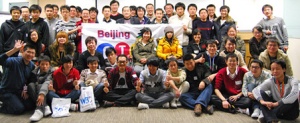
2009-12-15: W3C China Office supported Webrebuild.org with their first Web Standards Workshop in Beijing. Webrebuild.org works to promote Web standards and free discussion of Web standards in China. They have organized workshops on web standards in Shenzhen once each year since 2007. This event was also sponsored by the Beijing Google Technology User Group. The call for participants attracted over 200 people, but only 120 of them were lucky enough to get the pass due to the limited venue condition. The theme of the workshop was "Thoughts on Web Standards" and it aimed at offering a platform for the technical staff in Beijing to discuss and share ideas of how to make better use of Web standards and technologies. Invited technicians from Tencent, Yahoo and Taobao shared their experience and techniques of implementing W3C standards and had a lively interaction with the audience. The topics covered in the speeches of the invited technicians included browser compatibility, CSS3.0, HTML5 and ontologies. AnQi (Angel) Li from the W3C China Office gave an opening speech to welcome the attendees and introduced the W3C China Office. The workshop also attracted some media who videotaped the entire event allowing to share it on the Internet with more people.

2009-12-02: The W3C Spain Office organized 3 workshops on W3C Web Standards. These workshops were held in three public Spanish universities: Universidad de Murcia, Universidad de Granada, and Universidad de La Laguna. All of them showed great interest in co-organizing the event, and they suggested important topics not enough represented in the current curricula such as Web standards, or the W3C's role in the success of the Web.
The universities were randomly selected from cities where the W3C Spain Office had not organized previous events. The first three proposals to the universities were accepted instantly. Especially the departments of telecomm and computer science of these universities.
In a couple of weeks all the seats were booked out. 30% more attendees than the nominal capacity of the rooms were accepted. The rooms were completely full of attendees. Half of the attendees were students, and the rest were IT professionals (Web designers and developers, project managers, managers at local SMEs, etc), and representatives from Public Administrations. A detailed report on the workshops in English is available.
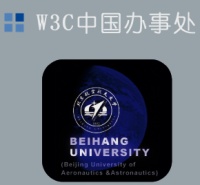
2009-12-01: The W3C China Office has released a brochure in Chinese. The brochure informs on 15 pages about W3C, its mission, its history, its principles and goals, technologies and standards, the organization of W3C, the W3C China Office and its host, terms of membership and member benefits, and more. The brochure will be disseminated at events wih W3C China Office presence and by the members of the W3C China community. It can be ordered by sending a mail to W3C China Office.
2009-11-22: The first W3C Brazil Conference - W3C Web.br 2009 will be held on November 23 and 24, 2009 in Sao Paulo, Brazil. The Conference is organized by the W3C Brasil Office and aims at offering to a large Brazilian audience an annual forum for discussion and debate on the evolution of the Web, the standardization of its technologies and the impact of these technologies in society and culture. The Conference will put together researchers, developers, users, businesses, digital content agencies, media and all those who are passionate about the Web and have something to offer, use and discuss. There will be a life broadcasts in English and Portuguese available on IPTVCULTURA. Among the speakers are Anne van Kesteren, Opera Software, on HTML 5 and Patrick Sinclair, BBC Audio and Music Interactive, on Linked data on the BBC.
2009-11-30: Update: More than 300 attendees were on the event. 400+ had tried to register. ~3000 followed the event online.
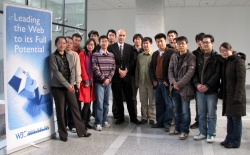
2009-11-21: Seeing a lot of W3C related work throughout China the W3C China Office organized a meeting with some of the activists. The idea was to exchange ideas, to learn from each other, and to form a community that cooperates recognized and coordinated by the W3C China Office. On Nov. 14th the event took place in the Convention center of Beihang University. 18 representatives from noted W3C related online forums and websites gathered. Many great ideas which might help to forward W3C's message, and to promote the use of W3C technologies and standards were generated. An initial action plan has been drafted during the meeting and a first community member mailing list had been set up.
The attendees were from following organizations: Blueideas, China W3C Standards Organization, Google Technology Beijing User Group, W3China.org, W3C Standards School, W3Ctech, W3School, and Web Page Designer. W3C China Office had invited Klaus Birkenbihl, W3C World Offices Coordinator in the W3C team, to help to prepare the event and to give his perspective on this project.

2009-10-20: Laurent Lefort, interim manager of the W3C Australia Office , chose a creative approach for a preliminary report about the W3C Track at Web Directions South. He made a quick summary using some photos and the twitter posts about the talks. The result is entertaining, humorous and informative. Laurent was inspired by Doug Shepers' talk (details see report).
2009-10-09: The W3C Spain Office and the Fundación CTIC organize a workshop on WCAG 2.0, which will be held on 21th October 200, in Madrid. This event will be presented by staff of W3C Spain Office and Fundación CTIC. The target audience is composed by Web developers, designers, and managers, with basic skills on web development (HTML, CSS, and Javascript). Learn more about the agenda, venue, and other details in the page of the event.

2009-10-08: José Manuel Alonso was manager of the W3C Spain Office before he decided to Join the W3C team as fellow of the Fundación CTIC. After working more than 3 years to establish W3C's eGovernment activity he now returns to CTIC as a researcher. In addition to this Josema will act as senior advisor to the W3C Spain Office. A cordial "welcome back" to someone who wasn't really away.
Another change takes place in the W3C Benelux Office. Not many may have heard of Miente Bakker. But Miente was the one who provided the infrastructure for the Office to operate smoothly since 2002. He also did the Richtlijnen voor de Toegankelijkheid van Web Content 1.0. the Dutch translation of the Web Content Accessibility Guidelines 1.0. Miente will leave the Office this month. W3C would like to thank Miente for all his effort and wishes him all the best for the future.
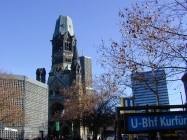
2009-10-08: On September 15th 2009, the W3C Germany and Austria Office organized the "W3C Tag" (W3C-day) in Berlin, hosted by the Xinnovations . The event welcomed around 30 participants mostly from the region of Berlin, but also from other areas of Germany. Topics like the German translation of the Web Content Accessibility Guidelines (WCAG) 2.0, new development in Semantic Web (SKOS, RIF) or HTML5 gathered a wide range of interest. Esp. the relation between the Semantic Web and the Web of humans (HTML5) was a concern of the participants, who are very interested in key technologies like RDFa and their support in HTML5.

2009-09-26: The Hypermedia Laboratory at Tampere University of Technology (TUT) and the W3C Finland Office will organize a Mindtreck seminar on Social Network Analysis (SNA) which focuses on patterns of relations between and among people, organisations, states and other actors. The main target of analysis is to describe network actor relations as fully as possible and, moreover, find the prominent patterns in such networks. This seminar "Working with Social Networks", on Wednesday 30 September, addresses the topics of SNA methods, tools, and applications in Webised application areas, and outlines the related areas of standardisation. The keynote speaker of the event is Dr. Martha Russell from Stanford University.

2009-09-22: As reported before the W3C Germany and Austria Office was moved from Fraunhofer-IAIS to the University of Applied Sciences in Potsdam. The re-opening will be celebrated with a conference "Teaching the Web" on October 15th. What does "my community" need to know about the web? Is knowledge about web architecture as important as XML or Semantic Web technologies, or can we expect that sooner or later all details will be hidden beneath nice user interfaces? The event invites people people who normally do not meet: web technology developers and "users" from a great variety of communities. Felix Sasaki, the manager of the W3C Germany and Austria Office, said: "We aim to consider goals of education about the web, and how to ensure that the web will persist at the most important place - in our minds."
Speakers are: Klaus Birkenbihl (W3C), Lambert Heller (TIB/UB Hannover), Patrick H. Lauke (Opera Software), Jens Meiert (Google), Petra Rauschenbach (Bundesarchiv), Henry S. Thompson (W3C), Robert Tolksdorf (Free University of Berlin), Andrew Vande Moere (University of Sydney) and Erik Wilde (University of California Berkeley). More info is provided in the event flyer.
2009-09-21: After more than 10 years in operation at the Institute of Computer Science (ICS) of the Foundation for Research and Technology – Hellas (FORTH), the W3C Greece Office celebrated its 10th anniversary on Sept. 16th. The W3C Greece Office was among the first five Offices that W3C launched in 1998 with help from the European Community. The event took place in the context of the ENISA-FORTH Summer School, co-organized by the European Network and Information Security Agency (ENISA) and FORTH. The goal of the celebration was to strengthen the ties between the W3C Members in Greece, the W3C Office and FORTH, as well as to exchange views on current, crucial matters regarding the World Wide Web.
Constantine Stephanidis, Director of the Institute of Computer Science, confirmed in his welcome that FORTH-ICS is happy to host the W3C Greece Office and will continue to support W3C in the future. Irini Fundulaki, the manager of the W3C Greece Office, introduced the programme of the event, that covered practical aspects of Web standardization, effective content recommendation in the context of social sites and searching, recording changes in ontologies and Web security. Keynotes where from Klaus Birkenbihl (W3C) and Sihem Amer-Yahia (Yahoo! Research Labs).

2009-09-02: The W3C Australia Office in partnership with Web Directions and with support from CSIRO and the World Wide Web Consortium (W3C) organized a series of talks by Australian and international speakers at Web Direction South Conference 2009, Oct 6-9, Sydney Australia. Laurent Lefort, interim manager of the W3C Australia Office said: "This W3C track is a unique opportunity to catch up with the latest developments in web standards and semantic technologies as it will cover work done by W3C staff, members and invited experts in developing open standards and guidelines for Web languages and protocols and work done in fostering innovative ideas for specifications, guidelines, and applications that are not (or not yet) clear candidates as Web standards."
Topics covered are: W3C and Web standards big picture, Semantic Web standards and mainstream web standards, Semantics & Sensors, Opening up Social Networks, the Open Web Education Alliance (OWEA) XG. Details about the W3C track can be found on the Web Direction South Conference 2009 page and in the W3C Australia Office News.
A discounted rate is offered to W3C members for the Web Directions South conference. Conference tickets are available at a price of $795 ($200 off) until September 9th, and then $895 ($100 off) until the conference starts.

2009-08-17: "Café with Browser" is a very successful event series etablished by the W3C Brazil Office which is hosted by the Brazilian Network Information Center – NIC.br. The Idea is to provide a forum for free talks with developers, researchers and the browser industry developers teams. The first edition (May 15th) brought Charles McCathieNeville, Opera's standards director. Then (June 19th), Mozilla Firefox was the next to have a sit. Chris Hofmann, Mozilla Foundation's director of engineering and special projects and Marcio Galli, consultant and active in the Mozilla community talked with the participants. “This Office initiative is an opportunity to check how much the browser industry is committed to web standards and to know what they are planning for the future in a short term. On the other hand it is also an opportunity to talk to the browser industry about expectations and needs of the user community”, says Vagner Diniz, W3C Brazil Office manager.
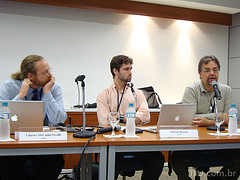 Now the W3C Brazil Office
invites people to participate in the third edition of “Café with Browser”
on 21 August, in São Paulo. Participants will talk on Microsoft Internet
Explorer 8 and its compliance to standards, its CSS 2.1
implementation and the Microsoft vision of the future of the web. Microsoft
will be represented by Fernando Gebara, Latin America standards manager, Pedro
Bojikian, IE product manager and Murilo Curti, Windows Team software
engineer.
Now the W3C Brazil Office
invites people to participate in the third edition of “Café with Browser”
on 21 August, in São Paulo. Participants will talk on Microsoft Internet
Explorer 8 and its compliance to standards, its CSS 2.1
implementation and the Microsoft vision of the future of the web. Microsoft
will be represented by Fernando Gebara, Latin America standards manager, Pedro
Bojikian, IE product manager and Murilo Curti, Windows Team software
engineer.
“Café with Browser” is an open and free meeting but with only a few places available. In the first meeting, "Café with Browser" had more than 50 attendees from government, Internet providers, telcos, digital agencies, developers and a few banks. In the last one, a webcast facility was introduced and there were around 40 people in the room and over 100 online participants, 15 of them overseas. Those who are interested in participating should send an e-mail to eventos@cgi.br. Online webcast will be provided. Web 2.0 tools also available. In Twitter, follow the hash tag #cafecombrowser. In Flickr, search for cafecombrowser.
Resources on previous events are available: Charles McCathieNeville, slides; Chris Hofmann and Marcio Galli, video in English; and Chris Hofmann, slides in English.

2009-06-05: Amit Parashar who managed the W3C Office Australia left CSIRO by end of May to accept another job offer. Amit joined the Office in July 2007 and soon took over from Ross Ackland as Office manager. Amit played a very active role in connecting the WWW community Australia with W3C. He launched or participated in a lot of tours and events on W3C technologies around the continent. He was also intrumental in launching the W3C Sensor Network Incubator Group. W3C likes to thank him for all his effort and for playing a leading role within the W3C Offices and wishes him every success for the future.
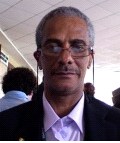

2009-05-26: W3C announces today the launch of the W3C Senegal Office, hosted by the Ecole Supérieure Polytechnique (ESP), attached to the UCAD (Université Cheikh Anta Diop), in Dakar, Senegal. The opening ceremony will be held on 27 May 2009.
Ibrahima Ngom (ESP) and Alex Corenthin (ISOC Segenal) will jointly run the W3C Senegal Office.
2009-05-16: W3C Morocco Office partners Morocco Internet Society (MISOC) for the 10th Internet Day in Morocco, entitled "Internet Governance: Issues and challenges for Morocco", Thursday 26 May 2009, Rabat, Morocco. The main topics to be discussed will be around the global governance of the Internet, the digital divide, the ongoing international negotiations on the management of domain names and on Standards, Technical Services and future of the Internet.
Daniel Dardailler gives a talk on behalf of the Morocco Office entitled "Improving Society through Better Use of Web Standards " , and Najib Tounsi will participate to a panel on the Future of Internet and speak about the role of W3C membership.
2009-09-11Update:The W3C Morocco Office made available a report on the event.
 2009-05-08: The Israeli Internet Association
(ISOC-IL), the host of the W3C Israel
Office, has appointed Yesha Sivan as new Office manager. Yesha is member of
the board of ISOC-IL and a senior lecturer at the Department of Software
Engineering, Shenkar College
of Engineering and Design. Yesha received his doctorate from Harvard
University, and is a research affiliate in Harvard's Program on Information Resources
Policy. He is also the founder of Metaverse Labs (MVL) which focuses on
linking virtual and real worlds.
2009-05-08: The Israeli Internet Association
(ISOC-IL), the host of the W3C Israel
Office, has appointed Yesha Sivan as new Office manager. Yesha is member of
the board of ISOC-IL and a senior lecturer at the Department of Software
Engineering, Shenkar College
of Engineering and Design. Yesha received his doctorate from Harvard
University, and is a research affiliate in Harvard's Program on Information Resources
Policy. He is also the founder of Metaverse Labs (MVL) which focuses on
linking virtual and real worlds.
Yesha follows Ori Idan who led the Office during the last year. W3C would like to thank Ori for his effort on this.
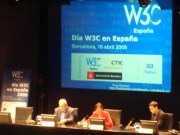
2009-05-08: As in previous years, during the first half of the year, the W3C Spanish Members are gathered together to discuss about W3C and its standards. The event has been organized by the W3C Spain Office and its host, the Fundación CTIC. This year, the Ajuntament de Barcelona (Barcelona City Council) has taken part in the organization, collaborating with logistics, providing the room and lunches. All the W3C Members with presence in Spain were invited to take part in the event. They were offered to give a talk (or participate in a panel) about use cases, failures, and successes using W3C technologies.
The Agbar Tower Auditorium, with a capacity of 320 seats, was the room used to hold the event. This skyscraper is one of the most emblematic buildings in Barcelona, located in the hearth of a new area in Barcelona where are hosted many ITC companies.
Almost 300 people attended the event. Even more would have to be expected but the registration had to be closed with 370 registrations. The average profile of the audience was technical: project managers, developers, designers, and some head of departments from a wide range of organizations. Representatives of big companies (i.e, Accenture, Capgemini, Indra, etc.), banks, universities, public administrations (national, regional, and local), and other small and medium local enterprises were present.
Almost all were Spanish, and the half part of them was from Catalonia. A detailed report was published by the W3C Spain Office.

2009-04-21: The 3rd Chinese Semantic Web Symposium (CSWS 2009) will be held in Nanjing, from August 29 to 31, 2009. Before the main symposium, a summer school on the logical foundation of the Semantic Web will be held. The main symposium includes keynote speeches, paper presentations, panel discussions, lightning talks, etc. CSWS 2009 will present the state of the art in Semantic Web research in China, and create opportunities of communication with experts from the Semantic Web community for participants.
Among the keynote speakers will be Ivan Herman, W3C Semantic Web Activity Lead. Jinpeng Huai, head of W3C China Office, is member of the Symposium steering committee. The event is organized by Southeast University, Nanjing in cooperation with the W3C China Office. The past two CSWSes was held in Beijing, November 2007 and Shanghai, December 2008, respectively.
2009-09-11Update:The W3C China Office has published a Report on the event.
2009-04-17: The W3C Greece Office participated in the WebSci'09: Society On-Line Conference, held from March 18th to March 20th, 2009 in Athens, Greece. The Conference was organized by the Web Science Research Initiative (WSRI) and the Foundation of the Hellenic World (FHW).
The main objective of the WebSci'09 Conference was to "bring social and computer scientists together across the disciplinary divide, in order to explore the development of the Web across different areas of everyday life and technological development". The areas of the on-line society and Web development that surfaced from the keynote talks, panels, papers and posters included (but were not limited to) E-commerce, Internet Law, Culture On-Line, E-Learning and, Government and Political Life.
The W3C Greece Office was present with a booth which was kindly supported in part by the Conference organizers. The W3C booth attracted about 300 people (a significant portion of the Conference's participants) who demonstrated their interest in W3C. Among the visitors was Sir Tim Berners-Lee, Director of W3C and inventor of the Web at its booth, along with Daniel Dardailler, Program Manager at the World Wide Web Foundation..

2009-04-10: After 12 years of successfull work at Fraunhofer (or former GMD) the W3C Germany and Austria Office moves from Sankt Augustin (near Bonn) to Postdam (near Berlin). New local host of the Office will be the University of Applied Sciences in Potsdam (FHP). An official hand-over ceremony is planned for September 2009.
W3C would like to thank Fraunhofer and the W3C Germany and Austria Office staff lead by Thomas Tikwinski for the excellent work during all the years. Thomas joined the Office in 2004 and took over as Office manager from Klaus Birkenbihl in 2005 when Klaus joined the W3C team.
Manager of the Office at FHP will be Felix Sasaki. From 2005 to 2009 he worked as part of the W3C team in Japan at the Keio University, mainly in the Internationalization Activity, and also in the area of Web Services and Multimedia metadata. His main field of interest is the combined application of W3C technologies for representation and processing of multilingual information. Today he holds a professorship in the area of libraries, archives and documentation at FHP.

2009-04-08: The W3C Greece Office has published a bilingual leaflet on W3C. In Greek and English it outlines the work of W3C and the W3C Greece office. The leaflet is available online in PDF format.
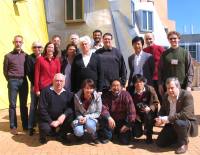
2009-04-07: W3C Offices held their annual face to face meeting on March 25th at MIT Cambridge MA. Adjacent to the recent W3C Advisory Committee Meeting that took place in March 23/24th W3C Offices discussed about their future role role in W3C. Exchange of plans and ideas, better co-operation between Offices especially in the same region, communication with relevant local communities where part of the agenda. 11 of the 16 W3C Offices participated in the event.
2009-03-12: The Mozilla-project will organize a
number of MozCamps in Europe, the kick-off will be in Utrecht on March 6. The
MozCamp-meetings are meant to offer ample room for discussions, hands-on demo's
and merging minds to come up with and implement activities to preserve the open
and participative character of the Internet. Together with other organizations
that promote open standards, software and Internet the W3C Belelux Office helps to arrange the event.
2009-03-04: W3C announces that the W3C Office India at CDAC is closed. CDAC is helping W3C in finding a new host for an Office in India. W3C would like to thank VN Shukla from CDAC for serving as W3C Office manager since 2006 and for his help in establishing a new W3C India Office.


2009-03-02: After working nearly 5 years for one of the most active W3C Offices Encarna Queseda left CTIC and the W3C Spain Office. Encarna joined the Office in April 2004 as a Trainee. January 2007 she followed José Manuel Alonso as Office manager, after José had joined the W3C Team . W3C has to thank Encarna for a lot of outreach and members support. W3C owes Encarna many well organized and recognized events, a lot of W3C promotional material and a series of excellent ideas. Encarna is starting-up a private company in the area of Internationalisation services. W3C wishes her health and success.
W3C welcomes Martín Álvarez as new W3C Spain Office manager. Martín joined the Office in 2005. Martín has a degree in Informatics Engineering and is well known by many talks on W3C technologies he gave on behalf of the W3C Spain Office. He is also creator of the new W3C Spain Office Web site which is the first Office page organized as a Blog.2009-02-06: Tim Berners-Lee, inventor of the web, founder and director of W3C , visited together with Rosemary Leith, Web Science Research Initiative Executive Director the NIC.br facilities, where the W3C Brasil Office is hosted. Tim was in Brazil as invited keynote speaker at Campus Party event. He was welcomed by the NIC.br directors Demi Getschko and Hartmut Glaser, and by Vagner Diniz, W3C Office Manager. During his three hours visit he also had a free conversation with W3C Brazilian members, Internet Governance Steering Committee members and guests from, universities, and private and public sectors. Tim said we are living exciting time, "technology is changing, environment is changing, what make W3C mission of leading the web to its full potential more exciting". In this context, Tim said he expects to hear from Brazil its specific point of view on how web should meet Brazilian needs.
In his introductory talk, Tim reminded the audience the W3C role in the future of the web: the art of creating consensus, to assure the web does the right thing and to keep the web technologies royalty free.
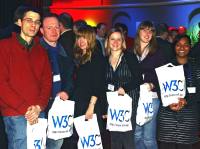
2009-01-21: About 400 people attended the New Years Event of ISOC.NL that was held Jan 15th in Amsterdam with support from many local and international internet related organisations based in the Netherlands. It was probably the biggest New Year event for the local internet community of the Netherlands ever!. Prominently among the co-organizers is the W3C Belelux Office which maintains a long standing cooperation with ISOC.NL. 4 of the 8 talks during the reception (10 to 15 minutes each) were on W3C subjects given by Ivan Herman, Steven Pemberton, Dick Bulterman and Eric Velleman.
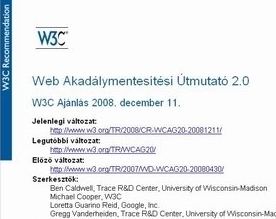 2009-01-20: The Hungarian
translation of the WCAG 2.0 Guidelines
has been published by the Hungary Office
entitled „Web
Akadálymentesítési Útmutató 2.0”.
2009-01-20: The Hungarian
translation of the WCAG 2.0 Guidelines
has been published by the Hungary Office
entitled „Web
Akadálymentesítési Útmutató 2.0”.
The translation of the Guidelines - and the related documents (most importantly: Understanding WCAG 2.0, Techniques for WCAG 2.0, and How to Meet WCAG 2.0) where the translation is under process - is supported by Hungarian national funds.
In the framework of a pilot project starting in February 2009 web accessibility is initiated as part of the curriculum at technical universities, and the translated WCAG 2.0 Guidelines will be used as a reference point in the subject area.
Furthermore, the legal background to web accessibility regulations is just being formulated in Hungary, and the documents in Hungarian will serve as a basis in the legal preparations. For the above reasons, it is also the Hungary Office's aim to make the authorized translation available as soon as possible.

2009-01-01: After he served nearly 6 years as manager of the W3C Greece Office Evangelos Markatos hands over to Irini Fundulaki. Evangelos started July 2001 as Office coordinator and became Office manager in February 2002. W3C would like to thank Evangelos for all his work and dedication.
Irini Fundulaki - the new Office manager - is an Associate Researcher in the Information Systems Laboratory at the Institute of Computer Science, Foundation for Research and Technology - Hellas (ICS-FORTH). She received her Ph.D. in Computer Science from the Conservatoire National des Arts et Metiers in Paris on January 2003. During her Ph.D. she was a member of the Verso Database group at INRIA-Rocquencourt. Irini after her PhD held first a PostDoc and then an MTS (Member of Technical Staff) position at the Network Data and Services Research Department at Bell Laboratories, Lucent Technologies. After leaving Bell Labs, she became a research fellow at the Database group of the University of Edinburgh. Her research interests include XML and RDF data management with a focus on access control, personalization of search, data integration and provenance management.
Irini will be supported by the Office secretary Anna Doxastaki who also supported Evangelos in his term as Office manager. W3C would like to welcome Irini and wishes her good luck and success for her new assignment.
Copyright © 1994-2006 W3C ® (MIT , ERCIM , Keio ), All Rights Reserved. W3C liability, trademark, document use and software licensing rules apply. Your interactions with this site are in accordance with our public and Member privacy statements.